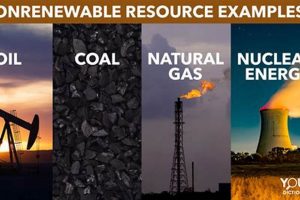
The core distinction between energy sources lies in their replenishment rates. Renewable sources, such as solar, wind, hydro, geothermal, and biomass, are naturally replenished over a relatively short period. Conversely, nonrenewable sources,... Read more »

Hydropower, the generation of electricity from water, utilizes the natural water cycle, a continuous process powered by solar energy. A dam typically impounds water in a reservoir, and this stored potential energy... Read more »

The declining cost of harnessing power from sources like solar, wind, and geothermal has created a shift in the energy landscape. For example, advancements in solar panel technology and mass production have... Read more »

Natural resources are categorized based on their replenishment rates. Resources capable of regenerating within a human timescale are considered sustainable or replenishable. Examples include solar energy, wind power, hydropower, geothermal energy, and... Read more »

Energy sources are broadly categorized into two fundamental types: those that replenish naturally over relatively short periods and those with finite reserves. Sources like solar, wind, hydro, geothermal, and biomass are constantly... Read more »

Nuclear fission involves splitting heavy atoms, like uranium, to release enormous amounts of energy. This process relies on a finite supply of uranium ore mined from the earth. While the energy produced... Read more »

Ocean energy derives from various sources, including tides, waves, currents, and thermal and salinity gradients. These sources are naturally replenished through cyclical processes like the lunar cycle, wind patterns, and solar radiation.... Read more »

Fossil fuels, like coal, oil, and natural gas, and nuclear fuels, such as uranium, represent finite energy sources. These materials are extracted from the Earth and are not replenished at a rate... Read more »

The core distinction between energy sources lies in their replenishment rates. Resources like fossil fuels (coal, oil, and natural gas) and nuclear fuels (uranium) are finite and deplete over time, taking millions... Read more »

Coal is categorized as a nonrenewable energy source because its formation takes millions of years. Organic matter, primarily plants, accumulates in swamps and bogs. Over time, this matter is buried under layers... Read more »


